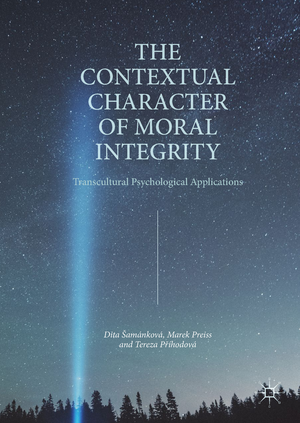The Contextual Character of Moral Integrity: Transcultural Psychological Applications
Autor Dita Šamánková, Marek Preiss, Tereza Příhodováen Limba Engleză Hardback – 26 iun 2018
| Toate formatele și edițiile | Preț | Express |
|---|---|---|
| Paperback (1) | 383.33 lei 6-8 săpt. | |
| Springer International Publishing – 10 ian 2019 | 383.33 lei 6-8 săpt. | |
| Hardback (1) | 389.70 lei 6-8 săpt. | |
| Springer International Publishing – 26 iun 2018 | 389.70 lei 6-8 săpt. |
Preț: 389.70 lei
Nou
Puncte Express: 585
Preț estimativ în valută:
74.57€ • 77.86$ • 61.58£
74.57€ • 77.86$ • 61.58£
Carte tipărită la comandă
Livrare economică 15-29 aprilie
Preluare comenzi: 021 569.72.76
Specificații
ISBN-13: 9783319895352
ISBN-10: 3319895354
Pagini: 155
Ilustrații: XXI, 229 p.
Dimensiuni: 148 x 210 mm
Greutate: 0.45 kg
Ediția:1st ed. 2018
Editura: Springer International Publishing
Colecția Palgrave Macmillan
Locul publicării:Cham, Switzerland
ISBN-10: 3319895354
Pagini: 155
Ilustrații: XXI, 229 p.
Dimensiuni: 148 x 210 mm
Greutate: 0.45 kg
Ediția:1st ed. 2018
Editura: Springer International Publishing
Colecția Palgrave Macmillan
Locul publicării:Cham, Switzerland
Cuprins
1. Introduction.- Part I: Philosophy and Psychology.- 2. The History of Ethics.- 3. Moral Psychology.- Part II: Biology.- 4. Evolution of Moral Sense and Moral Judgement.- 5. Can We Treat Evil?.- Part III: Moral Integrity Research.- 6. Integrity Concepts.- 7. Integrity in the Workplace.- 8. Integrity Testing in the Czech Republic.- Part IV: Cultural Views.- 9. Czechoslovakia and its Totalitarian Legacy.- 10. Personality and Ethics in Theravada Buddhism.- 11. Conclusions.
Notă biografică
Dita Šamánková is a consultant psychiatrist with extensive practice in the Czech Republic and Great Britain, currently employed as a clinician and researcher at National Institute of Mental Health (NIMH), Czech Republic; she has authored several popular science books, and regularly contributes to Czech socio-political and psychological magazines.
Marek Preiss is Associate Professor and the Head of Department of Clinical Psychology at NIMH, and the University of New York in Prague, leading research projects in the area of moral integrity, personality and neuropsychology, with abundant international publications.
Tereza Příhodová is a US graduated junior research psychologist and PhD student at NIMH, Czech Republic.
Textul de pe ultima copertă
“This book is a comprehensive and comprehensible coverage of the philosophical underpinning of the integrity construct as reflected in the Western literature—a must read for researchers and scholars interested in integrity assessments. The authors have integrated insights from several disciplines, and have written in a clear and engaging style. The Czech historical sketch gives an interesting background to these discussions.”
Professor Vish C. Viswesvaran, Florida International University, USA
This book discusses outcomes of a study by the National Institute of Mental Health, Czech Republic, examining moral integrity in the post-communist Czech-speaking environment. Chapters map the history of the Euro-Atlantic ethical disciplines from moral philosophy and psychology to evolutionary neuroscience and socio-biology. The authors emphasize the biological and social conditionality of ethics and call for greater differentiation of both research and applied psychological standards in today’s globalised world. Using a non-European ethical system – Theravada Buddhism – as a case study, the authors explore the differences in English and Czech interpretations of the religion. They analyse cognitive styles and language as central variables in formatting and interpreting moral values, with important consequences for cultural transferability of psychological instruments. This book will appeal to academics and other specialists in psychology, psychiatry, sociology and related fields, as well as to readers interested in the psychology of ethics.
Caracteristici
Calls for greater differentiation of both research and applied psychology standards in the globalised world Examines the cultural and political sources of the current Czech moral sentiments Studies the concept of moral integrity from an Eastern European perspective
